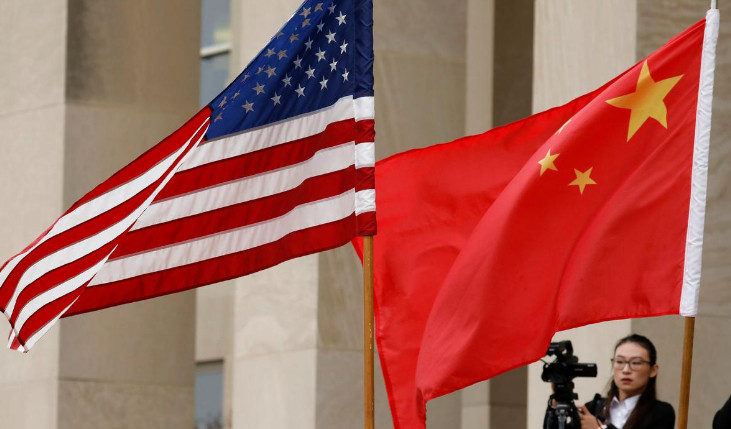US-China relations are likely to worsen before they get better

The first half of 2020 has seen a deterioration in US-China relations. With the US presidential election on the horizon, and anti-China sentiment on the rise across the US, the situation could worsen before it improves.
Already, the tense relations have become broader than a ‘trade war’. For the US, amid falling poll numbers for Trump and a hit to the economy by COVID-19, being tough on China is a vote winner. This in part explains the US’s support for the Taiwanese government and for Hong Kong’s pro-democracy protesters, which are both causing tensions. Republicans and Democrats are also united in criticising China’s human rights record.
This is fundamentally changing the relationship between the US and China, going far beyond Trump himself and creating a relationship mired by mistrust and blame. The channels of diplomacy between the two countries are worse than they have ever been, which makes things harder.
In a US election year, there is a particular risk of kneejerk decisions. While there may be public support across the aisle for getting tough on China, this makes the situation trickier.
One such casualty could be the trade deal between the two countries. The phase-one trade deal agreed in January is most likely to remain in place, but there is a strong risk that it could collapse because China is not on track to meet the obligations of the deal, such as buying more agricultural produce from the US. This makes the agreement ripe for scrutiny when it comes up for a semi-annual review in August.
Meanwhile, markets have had a chance to discount hazards, such as the implications of new US restrictions on exports to Huawei, threatened controls on US institutions investing directly into Chinese equities, and the increased auditing demands on US-listed Chinese companies. But if things get worse, there is still a lot of downside risk, especially in the stock market.
An escalation in the trade war would inflict further pain on US companies and consumers – a key trade-off that even Trump would have to recognise in an election year. It is simply impossible for the Trump administration to be too “anti-China” without damaging the US’s interests, which may provide a measure of economic protection but there is still a lot to be concerned about.
A Joe Biden presidency could see the US go down the path of multilateral action, as was seen over the global response to Hong Kong’s national security law. In the long run, this could be economically far more meaningful for China; but for now, it is probably easier for other countries to go along with the US rhetoric, given the unpredictable nature of Trump.
Countries and companies, however, need to set that against the huge economic importance of China. Does it make long-term sense to pick sides with the US? For the bulk of the world, the benefits of being compliant with the US and alienating China are not clear. This is especially the case with Huawei, which has 5G technology that is far better and cheaper than its competitors, making it difficult to cut China out without significant supply chain and pricing pain.
On Hong Kong, the US is likely to pursue targeted sanctions against people and entities, particularly against companies involved in law enforcement and surveillance within Hong Kong.
However, a mooted removal of the city’s autonomous status, which would subject it to the same tariff rules as mainland China, would not be economically significant, as there is not much manufacturing in Hong Kong itself. Such a move would be a political signal to China rather than an economic hit to Hong Kong and would not bring about any substantive change in the territory’s position as an export hub or, in the near term, a financial access point to mainland markets.
That said, over a longer horizon, China’s increased influence in Hong Kong may weaken its attractiveness as a business centre. There are a lot of US businesses based in Hong Kong and it would be quite hard to change the status without significantly harming them.
Despite this, the territory could benefit economically over the longer term were mainland companies to move their primary listing from the US to Hong Kong. A forced delisting of a large swathe of the Chinese equity market away from Nasdaq would be massively beneficial for trading volumes on the Hong Kong Exchange. It would also shift the centre of gravity of emerging market investing much more locally.
But given the evolving situation in Hong Kong, investors will be mindful that the picture could quickly change.
- Contact us at [email protected]
-

Equip young people for the future Dr. Winnie Tang
In late February, the inaugural flight of an air taxi from Shenzhen Shekou Cruise Homeport to Zhuhai Jiuzhou Port took only 20 minutes with an estimated one-way ticket price of 200 to 300 yuan per
-

Are we raising a generation of leaders, or of followers? Brian YS Wong
The essence of education is defined not by the facts it imparts, but the potential knowledge it inspires students to individually pursue on their own. Put it this way – the ideal form of education
-

The urgent need for reforms to sex education in Hong Kong Sharon Chau
Nearly one in every four university students (23%) in Hong Kong has been sexually harassed, according to a 2019 report published by the Equal Opportunities Commission (EOC). A 2019 study found that
-

STEAM should be linked to real life Dr. Winnie Tang
In the 2017 Policy Address, STEM (science, technology, engineering and mathematics) education was proposed as one of the eight major directions to promote I&T development. Since then, funding has
-

Let trees speak for themselves Dr. Winnie Tang
I often say that smart cities start with smart planning, but smart planning presupposes adequate, systematic and up-to-date data. This is important not only for city administration, but also for tree















